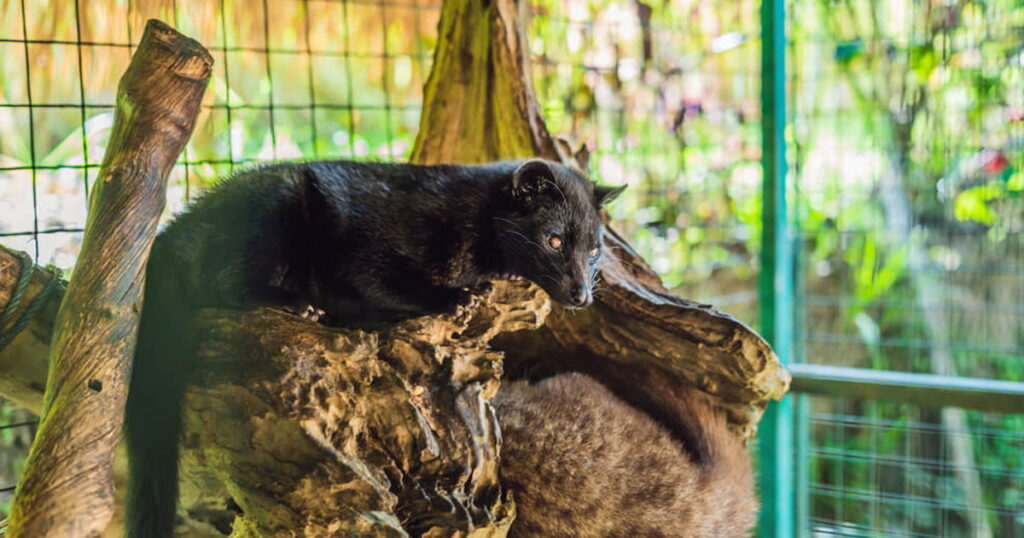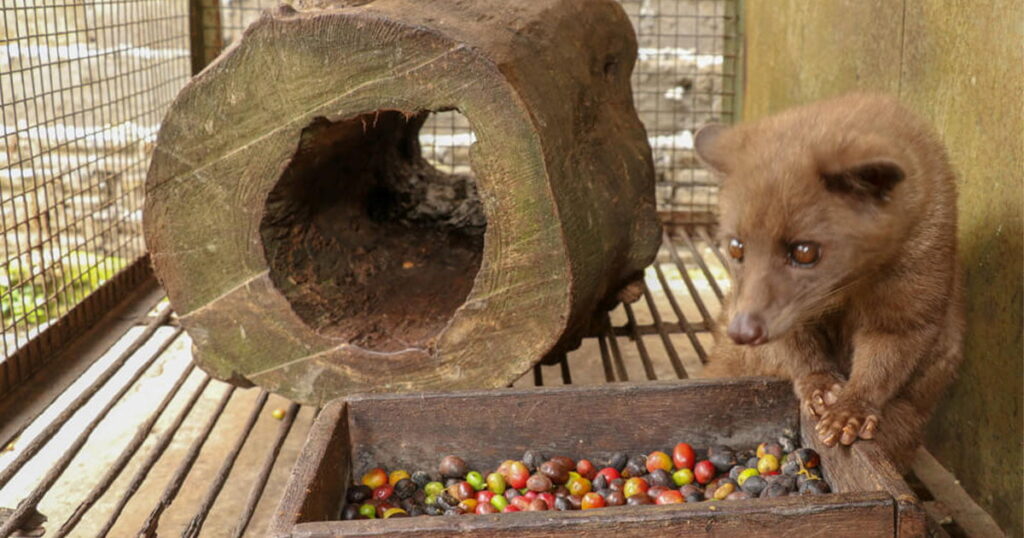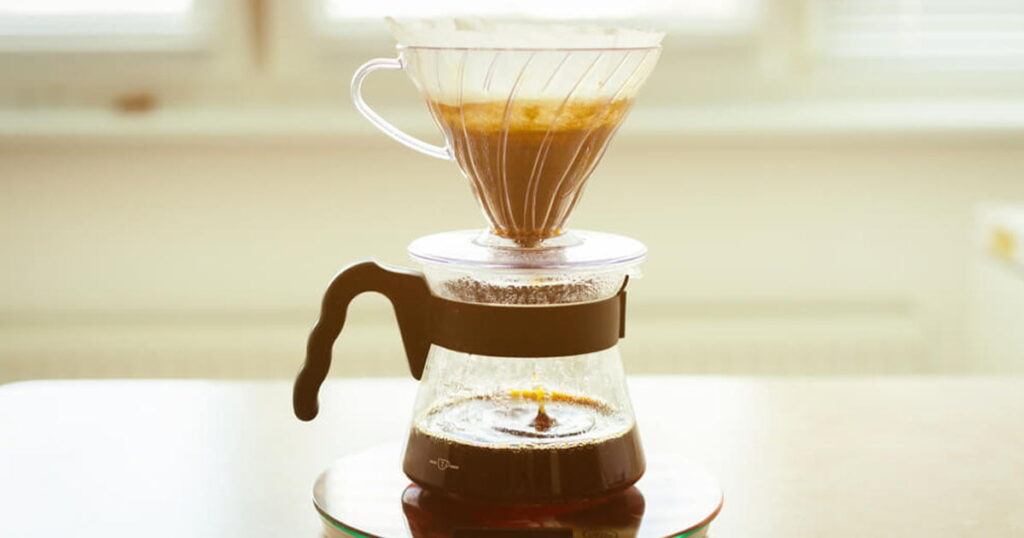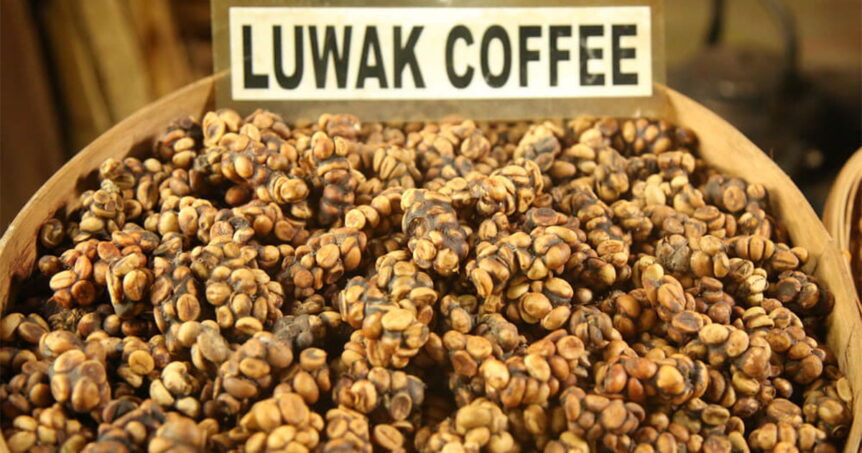Kopi Luwak coffee beans are harvested from the droppings of an Asian palm civet cat native to Indonesia. It’s believed that inside the kitty’s digestive system occurs a unique fermentation process that makes the brew taste heavenly.
Believe it or not, this story sells, making Kopi Luwak the most expensive coffee in the world. But what’s the actual truth behind it? What do the studies say? How to make Kopi Luwak in your home? If you want answers to these questions, you are in the right place. Let’s get started.
What Is Kopi Luwak Coffee?
In Indonesian, “kopi” means “coffee,” and “luwak” means “civet cat,” so ‘kopi luwak” translates to “cat coffee.”

A specialty coffee with controversial origins, it has achieved the status of “bling coffee” due to short supply and extravagant prices.
In the islands of Sumatra and Java lives an animal resembling a cross between a cat, a possum, and a weasel called an “Asian Palm Civet Cat.” A nocturnal animal that eats the ripest of coffee cherries, partially digests it, and defecates the fermented beans, which are then collected, washed, and roasted for brewing. So, yeah! It’s essentially just cat poop.
It’s believed that some kind of novelty fermentation that goes in a civet cat’s digestive system breaks down proteins, decreasing the overall bitterness and acidity, giving it a unique profile.
What Is Kopi Luwak Coffee Made Of?
Kopi Luwak coffee is a product of special coffee beans attained from civet cat droppings native to Southeast Asian countries. It’s widely believed that the digestive juices in the civet’s stomach kick-start a fermentation process that alters the taste of the coffee beans. The droppings are collected, dried, and roasted to remove impurities and bacteria and sold at a premium price.
What Kind Grounds Are Used for A Good Kopi Luwak Coffee?
Kopi Luwak coffee is best prepared using traditional brewing methods like the moka pot or drip coffee. Courser coffee grounds work well for extracting its unique flavor.
While it is not typically preferred as an espresso drink, it is interesting to note that Nespresso sells Kopi Luwak espresso pods.
How Much Caffeine Is in A Kopi Luwak Coffee?
The caffeine content of any coffee depends upon the type of coffee beans and the brewing method. Since Kopi Luwak coffee refers to a specific type of coffee beans, it’s best to compare it with Arabica and Robusta coffee beans.
Research shows that kopi luwak coffee has 22% less caffeine, protein, and sugar content than Arabica coffee. A typical brewed kopi luwak coffee has around 30-40 mg of caffeine per 100 grams.
How Many Calories Are in A Kopi Luwak Coffee?
A simple black Kopi luwak coffee without any additives has about 2-3 calories per serving.
The History of Kopi Luwak Coffee
If you’re curious about the audacious individual who first came up with the idea of brewing coffee from cat poop, rest assured you’re not alone.
In the 1800s, the Dutch colonized Java and Sumatra islands of Indonesia and grew Arabica coffee. Poor locals weren’t allowed to touch the coffee fruits, which they themselves were forced to harvest, but they discovered a way around it. They found that Civets gobbled up the fruits and pooped out undigested seeds.
The locals got crafty, collecting and cleaning those poop-covered seeds. They roasted and ground them, creating their special coffee. Word spread and everyone craved a sip. Eventually, the Dutch found out and started making profits out of it as well.
Fast forward hundreds of years, and it became a popular coffee drink when Bali became a hot tourist spot.
In 1981, Tony Wild stumbled upon a brief mention of kopi luwak in a National Geographic Magazine. A decade later, in 1991, as the coffee director of Taylors of Harrogate, he made history as the first to introduce Kopi Luwak to the Western world by importing it.
It became a world sensation when Opera Winfrey discussed it in her morning show, and later news outlets blew it out of proportion. Suddenly everyone was talking about this extremely expensive exotic coffee from Indonesia.
However, as the demand increased, it led to the unethical treatment of civet cats and the rampant rise of fraudulent Kopi Luwak beans in the market.
Tony later regretted introducing it to the mainstream and called it “overpriced, industrialized, cruel – and frequently inauthentic.”
Who Invented Kopi Luwak Coffee?
During the Dutch colonization of Java and Sumatra in the 1800s, locals were prohibited from picking coffee fruits. However, they ingeniously learned that Civets consumed the fruits and excreted undigested seeds. Collecting, cleaning, and roasting these unique seeds, they created their special coffee.
Where Is the Kopi Luwak Coffee From?
Kopi Luwak is mainly produced in Sumatra, Java, and Bali islands in Indonesia and some neighboring Southeast Asian countries like the Philippines, Vietnam, and Thailand.
Is Kopi Luwak Coffee Clean and Safe To Drink?
Yes, the washing and roasting process effectively removes any chaff and bacteria from the Kopi Luwak beans, ensuring they are safe for consumption.
Is Kopi Luwak Coffee Safe for The Animals?
No, modern Kopi Luwak coffee beans are mostly sourced from civet cat farms where the poor animal is caged in tight spaces and is forced fed only coffee cherries.

Though civets eat coffee beans, it’s not their only diet source which also includes insects and other fruits. Due to insufficient nutrients and poor hygienic conditions, the civet cats live a miserable life and die prematurely.
Many companies have been accused of greenwashing their products and mislabeling them as ethically sourced, even though they aren’t. In 2013, a BBC undercover investigation found out that coffee sourced from caged Luwaks held in cruel conditions was falsely marketed as wild luwak coffee.
Since it’s hard to find a company that ethically sources this coffee, the experts at PETA strongly suggest against buying Kopi Luwak coffee.
But hey, don’t lose hope! You can still get your hands on Kopi Luwak from brands that source their coffee from certified Rainforest Alliance and UTZ suppliers, as these two organizations make sure that the coffee isn’t from inhumane civet cat farms.
How Much Does Kopi Luwak Coffee Cost?
Kopi Luwak holds a Guinness world record for the most expensive coffee. It costs $100-$1300 per kilogram, depending on the type and quality. In the US, a cup of Kopi Luwak can cost anywhere between $30-$100; in Europe, a cup costs £30- £80 euros, which is crazy.
Why Is Kopi Luwak Coffee So Expensive?
Kopi Luwak is expensive because it’s rare. In 2014 the estimated yield was only 127 kg per year. Since then, unethical caged farming has really picked the production, and now 500 tons are produced annually. However, this supply is still not enough to meet the demand, and prices remain high.

How to make Kopi luwak coffee?
Kopi Luwak isn’t a type of coffee but a name of specialized coffee beans from Indonesia harvested from the Asian palm civet cat’s scat which sounds disgusting, but after going through proper treatment, it’s perfectly safe to enjoy. If you want to enjoy this specialty coffee, here are the steps you can take.
- Find the Real Deal: Before you even think of brewing Kopi Luwak, there is the issue of finding real authentic coffee beans. You need to be careful of tons of fake and mislabeled kopi luwak circulating in the market. Find a supplier who is credible and certified so that you get an authentic taste.
- Coffee Grind: We will use the drip coffee method to brew Kopi Luwak beans, and for that, we are using the classic Hario V60 dripper and decanter. You can use any method you want. It doesn’t matter.
- Take 18g of beans and set the grind size to course. It will help extract the flavor properly. Heat 300ml of water just short of boiling temperature.
- Put filter paper in the V60 dripper and rinse it with little water to remove any residual taste.
- Blooming Phase: Place the V60 dripper on the drip decanter. Next, pour in the grounded kopi luwak beans and make a little well in the middle, as it will play a big part in the bloom phase.
- Gently pour a small amount of water and soak all the coffee grounds. Stir using a spoon or just whirl it to really mix everything up. It’ll have a lumpy and thick look. Now let it rest for 40-45 seconds.
- Coffee Brew: Gently pour the rest of the water in a circular motion. Make sure you agitate the coffee bed a little while pouring for better tasting extraction. Once you reach closer to the top, pour even slower so as not to disturb the coffee bed.
- Use a spoon to give it a gentle stir. Wait for the coffee to drip completely. Viola! You’ll have a perfect brew of koi luwak coffee.
- Hario V60 Dripper
- V60 Drip Decanter
- Filter Paper
- Coffee grinder
- Coffee scale
- Freshly roasted Kopi Luwak coffee beans
- Filtered water
- Find a credible and certified kopi luwak supplier to ensure an authentic taste.
- For our brewing method, we use the classic Hario V60 dripper and decanter but feel free to use any method you prefer.
- Take 18g of coarse-ground Kopi Luwak beans. Heat 300ml of water just below boiling point. Put the V60 drip over the decanter.
- Place a filter paper in the V60 dripper, rinse it, then add the grounds. Pour a small amount of water to soak the grounds, stir gently, and let it rest.
- Pour the remaining water in a circular motion, agitating the coffee bed. Stir gently, and let it drip.
Kopi Luwak Coffee Recipe

Equipment
Ingredients
Instructions
Frequently Asked Questions
Is Luwak Coffee Healthy?
Yes, Kopi Luwak coffee is healthy, just like any other coffee. However, you must keep the intake within the healthy range set by medical professionals, 4 to 5 cups per day.
Does Kopi Luwak Taste Good?
According to the Specialty Coffee Association of America (SCAA), kopi luwak doesn’t taste good, or at least compared to other specialty coffee, it’s nothing groundbreaking. However, it still scores above 80 in the cupping score, which is the cutoff for specialty coffee.
Kopi Luwak coffee offers a medium body with delicate spiciness and subtle chocolate undertones. It carries green, grassy notes reminiscent of the jungle and has minimal acidity. The finish leaves a unique and slightly velvety sensation. However, it lacks a distinct character.
Does Luwak Coffee Have Caffeine?
Yes, it has caffeine, but it’s in lower amounts than Robusta and Arabica beans. Studies show it has about 22% less caffeine than regular Arabica beans.
Do They Wash Kopi Luwak?
Yes, Kopi Luwak beans go through the proper washing and roasting process, which makes them perfectly healthy for brewing.
Can Vegans Drink Kopi Luwak?
Being vegan is all about supporting sustainable practices, and since there is a lot of controversy surrounding civet cat farming, it’s better to avoid it.
Yes, some suppliers claim to ethically source the Kopi Luwak coffee beans, but it’s hard to verify it.
We recommend researching and verifying the production methods and certifications of the specific brand or supplier to align with personal vegan values.
Is Civet Coffee Animal Cruelty?
Not necessarily. Kopi Luwak obtained from wild civet cats in nature is perfectly fine and safe for the animal.
However, it has become a hub of animal cruelty in modern times as unhygienic and unethical civet cat farms are booming in Asia without any checks to meet the demand. Animal rights activists suggest against buying Kopi Luwak coffee as verifying the source is hard.
Can You Get Sick from Civet Coffee?
No, you can’t get sick, as roasting removes harmful bacteria and viruses from the Kopi Luwak beans.
Is Kopi Luwak the Best Coffee?
Even though it’s technically a specialty coffee, its flavor profile is lackluster. Coffee connoisseurs think it’s overrated and certainly not worth the premium price.
Summary
Kudos if you made it to the end. We’ve discussed the intriguing world of Kopi Luwak coffee, from recipes to its controversial origins.
However, considering its sky-high price tag and the ethical issues surrounding animal welfare, we reckon there are tastier specialty coffees out there that won’t break the bank or leave a bitter aftertaste in your conscience.

